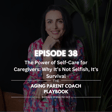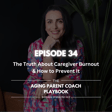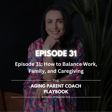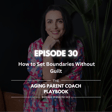Become a Creator today!Start creating today - Share your story with the world!
Start for free
00:00:00
00:00:01

Episode 27: Coping with the Slow Loss: How to Grieve a Parent Who’s Still Here
In today’s episode, I’m opening up about one of the hardest parts of caregiving—watching a parent decline.
No one prepares you for the slow heartbreak of losing pieces of someone you love while they’re still physically here.I’ll share:
- Why anticipatory grief is real (and why you’re not "doing it wrong" if you feel it)
- How I’m coping with the emotional weight of caregiving
- The simple ways I stay connected to my parent, even as things change
- How I find small moments of joy and love, even through the pain
This is a deeply personal episode, and if you’re going through this too, please know you’re not alone.If you need more support, visit theagingparentcoach.com for resources and 1:1 coaching.And if this episode resonates with you, I’d be honored if you shared it with someone who might need it too.Take care of yourself—you matter too.
Transcript
Introduction to Emotional Challenges in Caregiving
00:00:01
Speaker
Welcome back to the Aging Parent Playbook. I'm Dr. Barbara Sparacino, and today we're diving into something that so many caregivers struggle with, watching a parent decline.
Normalizing Emotional Pain in Caregiving
00:00:10
Speaker
Now look, this is the part that no one prepares you for.
00:00:12
Speaker
Maybe you've noticed your one strong father struggling to get up from a chair, or your mom, who never missed a detail, now forgetting the names of her grandchildren. It's heartbreaking. And the hardest part, they're still here, but they're also slipping away.
Grief and Connection During Parental Decline
00:00:25
Speaker
Today wanna talk about why this emotional pain is completely normal, how to cope with grief before loss, how to stay present and connected even as things change. This is one of those episodes that might bring up some deep emotions and that's okay.
00:00:39
Speaker
Let's get into
Unique Grief in Caregiving
00:00:40
Speaker
it. Why does watching parent's decline hurt so much? Caregiving isn't just about tasks and logistics. It's about losing the person they used to be while they're still here.
00:00:50
Speaker
And that's in a unique kind of grief And what this feels like in real life is watching them forget
Experiences of Memory Loss and Physical Decline
00:00:56
Speaker
your name. A woman in one of my caregiver groups once told me, the day my mom didn't recognize me, i felt I lost her twice, once in life and again when she passed.
00:01:06
Speaker
It's seeing them struggle to walk when they used to run. A man spoke and man i spoke to said he remembers his father running marathons. Now, just walking to the mail box is a struggle.
Understanding Anticipatory Grief
00:01:16
Speaker
I see the strong man he was, but I also see the frail man he's become.
00:01:21
Speaker
It's painful. It's feeling helpless when they refuse help. A daughter shared that her mom, once fiercely independent, refuses assistance with basic tasks. I have to watch her struggle when I could just step in and do it, but she won't let me.
00:01:36
Speaker
And I don't know how to make
Emotional Burden and Recognizing Grief
00:01:38
Speaker
it easier. This is called anticipatory grief. It's mourning the slow loss of who they were even before they're physically gone. And it's completely normal.
00:01:47
Speaker
But that doesn't make it easy. How do we cope? with the emotional weight of caregiving. So how do you manage this pain? How do you carry this emotional burden without letting it break you? It's important to recognize that in anticipat anticipatory grief is real.
Support Systems for Caregivers
00:02:00
Speaker
You're grieving before loss and that's okay. You might feel sadness, anger, guilt, even numbness. Some days you'll feel relief that they're still here. Other days you'll feel exhausted by the weight of it all.
00:02:12
Speaker
I remember a client telling me, I feel guilty because I miss the mom she was. I love her, but I also miss her at the same time. That's the reality of caregiving.
Finding Community and Combating Loneliness
00:02:21
Speaker
It's important to lean on a support system. Therapy, caregiver support groups, or even just a trusted friend who listens can help.
00:02:28
Speaker
And sometimes just saying, this is hard and I hate watching this happen can be a relief. It's important to find people who understand because not everyone will.
Self-care for Caregivers
00:02:39
Speaker
One of the best things you can do is find a group of caregivers who get it because nothing is lonelier than grieving someone who is still sitting in front of you.
00:02:49
Speaker
Remember to take care of yourself too. Caregivers often ignore their own emotions. Give yourself permission to feel sad, to cry, to be frustrated, but also give yourself permission to take a break.
00:02:59
Speaker
You can't be strong for someone else if you're breaking inside.
Connecting Through Music and Stories
00:03:03
Speaker
And there is ah high risk of depression and anxiety in caregivers. Now, we can find joy in small moments.
00:03:10
Speaker
And this is the one of the most important things I want you to take from this episode. Even as your parent declines, moments of of connection are still possible. and These moments matter. Share stories from their past.
00:03:21
Speaker
Even if their memory is fading, their emotions are still
The Power of Shared Moments
00:03:24
Speaker
intact. Pull out old photo albums, ask them about their childhood, share funny stories. Even if they don't remember, they'll feel the love behind it.
00:03:32
Speaker
Play their favorite music. Music is one of the last memories to fade. Even people with late stage dementia light up when they hear songs from their past. Put on their favorite songs and just sit with them Hold their hands even if words are gone.
00:03:46
Speaker
If they can't communicate anymore, just be present. Physical touch is powerful. A hand on theirs, a hug, even sitting beside them in silence is meaningful. At the end of the day, love remains even when everything else fades.
Encouragement and Resources
00:04:00
Speaker
If today's episode resonated with you, please know this, you are not alone. The pain of watching a parent decline is one of the hardest things you'll ever go through, but you don't have to do it alone.
00:04:11
Speaker
If you need more support, Visit theagingparentcoach.com for resources and one-on-one coaching. And if this episode helped, please share it with someone who needs it.
00:04:22
Speaker
Until next time, take care of yourself.



















